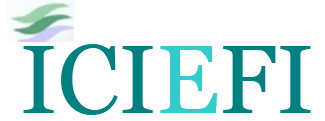Impact of Green Banking Implementation, Financial Performance, and Covid-19 Crisis on Islamic Bank Profitability in Indonesia
Abstract
The purpose of this research is to test empirically the impact of green banking implementation, financial performance, and Covid-19 crisis on Islamic bank profitability in Indonesia for the period of 2015-2021. This study uses two quantitative approaches, specifically static panel data method and dynamic panel data method (generalized method of moments or GMM). The secondary data used in this paper with a total sample of 10 Islamic commercial banks in Indonesia. This study finds that the implementation of Green Banking as the main determinant has a significant relationship to the profitability of Islamic Banks in Indonesia. The study also finds that financial performance variables such as CAR, NPF, and OEF show that contribution to the level of Islamic bank profitability in Indonesia. Further, other finding regarding the dummy crisis variable, Covid-19 crisis finds that a strong relationship to the Islamic bank profitability. It means that Covid-19 crisis will impact negatively to Islamic bank profitability in Indonesia. Based on the results of the robustness check, the model in this research is stated to be robust. The findings are expected to be useful for policy makers as well as for Islamic banking circles. Research results can be used as input in formulating policies in achieving sustainable development goals and economic and social recovery programs after the Covid-19 pandemic.
Keywords
Full Text:
PDFReferences
Achsani, M. N. F. F., & Kassim, S. (2021). Determinant of Indonesian banking profitability: Case study dual banking system. International Journal of Islamic Economics and Finance (IJIEF), 4(SI), 1–18. https://doi.org/10.18196/ijief.v4i0.10464
Amin, M. F. Bin. (2022). Asymmetric impact of oil prices and stock prices on bank’s profitability: Evidence from Arab Saudi Islamic banks. International Journal of Islamic Economics and Finance (IJIEF), 5(1), 31–58. https://doi.org/10.18196/ijief.v5i1.11835
Anggraini, D., Aryani, D., & Prasetyo, I. B. (2020). Analisis implementasi green banking dan kinerja keuangan terhadap profitabilitas bank di Indonesia (2016-2019). (JBMI) Jurnal Bisnis, Manajemen, Dan Informatika, 17(2), 141–161.
Anggraini, S., Fasa, M. I., Suharto, & Fachri, A. (2022). Analisis pengaruh green banking terhadap profitabilitas bank umum syariah Indonesia. Journal of Business Management and Islamic Banking, 1(1), 73–88.
Anisa, S. T., & Anwar, S. (2021). Determinan profitabilitas bank umum syariah di Indonesia dengan tingkat likuiditas sebagai variabel intervening. (JPS) Jurnal Perbankan Syariah, 2(2), 131–149. https://doi.org/https://doi.org/10.46367/jps.v2i2.346
Arellano, M., & Bond, S. (1991). Some tests of specification for panel data: Monte Carlo evidence and an application to employment equations. The Review of Economic Studies, 58(2), 277–297. https://doi.org/10.2307/2297968
Ascarya, A. (2022). The role of Islamic social finance during Covid-19 pandemic in Indonesia’s economic recovery. International Journal of Islamic and Middle Eastern Finance and Management, 15(2), 386–405. https://doi.org/10.1108/IMEFM-07-2020-0351
Ascarya, A., & Yumanita, D. (2010). Determinan dan persistensi margin perbankan (Pusat Pendidikan dan Studi Kebanksentralan, Bank Indonesia; PPSK Working Paper Series No: WP/10/04, Vol. 1, Issue 1).
Chamani, A., Anshory, A., Hudaefi, F. A., Junari, U. L., & Zaenal, M. H. (2020). The role of zakat institution in preventing COVID-19. In Policy Brief (Issue March). https://puskasbaznas.com/publications/published/policybrief/1186-the-role-of-zakat-institution-in-preventing-covid-19
Chen, J., Siddik, A. B., Zheng, G., & Masukujjaman, M. (2022). The Effect of green banking practices on banks’ environmental performance and green financing: An empirical study. Energies, 15(1292), 1–22.
Choubey, A., & Sharma, M. (2022). Green banking: The case of the commercial banking sector in Delhi NCR. Journal of Environmental Planning and Management, 65(11), 1975–1998. https://doi.org/10.1080/09640568.2021.1955336
Gujarati, D. N. (2003). Basic econometrics (4th ed.). US: McGraw-Hill.
Gujarati, D. N., & Porter, D. C. (2012). Buku 1 dasar-dasar ekonometrika (5th ed.). Yogyakarta: Salemba Empat.
Gunawan, J., Permatasari, P., & Sharma, U. (2022). Exploring sustainability and green banking disclosures: A study of banking sector. In Environment, Development and Sustainability (Vol. 24, Issue 9). Springer Netherlands. https://doi.org/10.1007/s10668-021-01901-3
Hanif, Ningsih, N. W., & Iqbal, F. (2018). Green banking terhadap profitabilitas bank umum syariah di Indonesia. Fidusia Jurnal Ilmiah Keuangan Dan Perbankan, 3(2), 86–99.
Hasanah, N., & Hariyono, S. (2022). Analisis Implementasi green financing dan kinerja keuangan terhadap profitabilitas perbankan umum di Indonesia. Jurnal Ekobis: Ekonomi, Bisnis, & Manajemen, 12(1), 149–157.
Iman, N. F., & Umiyati. (2022). Analisis determinan atas profitabilitas bank syariah di Indonesia. Jurnal Akuntansi Dan Keuangan Islam, 10(1), 31–54. https://doi.org/DOI: https://doi.org/10.35836/jakis.v10i1.280
Imsar, & Harahap, M. I. (2022). Analisis determinan profitabilitas bank BUMN syariah di Indonesia. JIBF MADINA: Jurnal Islamic Banking and Finance, II(I), 42–55.
Isayas, Y. N. (2022). Determinants of banks’ profitability: Empirical evidence from banks in Ethiopia. Cogent Economics & Finance, 10(2031433), 1–15.
Ken, G., & Santioso, L. (2022). Determinan profitabilitas perbankan yang terdaftar di BEI periode 2018-2020. Jurnal Ekonomi, 3, 358–378.
Laili, Y., & Bawono, A. (2022). Determinan profitabilitas dengan pembiayaan bagi hasil sebagai variabel intervening pada bank umum syariah. Mandiri: Jurnal Akuntansi Dan Keuangan, 1(2), 19–29.
Lako, A. (2014). Green economy. Jakarta: PT. Gelora Aksara Pratama.
Miroshnichenko, O. S., & Brand, N. A. (2021). Banks financing the green economy: A review of current research. Finance: Theory and Practice, 25(2), 76–95. https://doi.org/10.26794/2587-5671-2021-25-2-76-95
Mondol, D. K., & Wadud, A. (2022). Determinants of profitability of commercial banking in Bangladesh : A panel analysis. International Journal of Statistical Sciences, 22(1), 115–143. https://scholar.google.com/citations?view_op=view_citation&hl=en&user=o1eVolsAAAAJ&cstart=20&pagesize=80&citation_for_view=o1eVolsAAAAJ:k8Z6L05lTy4C
Nath, V., Nayak, N., & Goel, A. (2014). Green banking practices: A review. IMPACT: International Journal Of Research In Business Management, 2(4), 42–62.
Pamuncak, M. B., & Wijaya, A. P. (2022). Investigating the determinants of shariah-compliant firms profitability in Indonesia: Does COVID-19 play an essential role? AL-MUZARA’AH, Special Is(Special Issue), 31–41. https://doi.org/10.29244/jam.specialissue2022.31-41
Pindyck, R. S., & Rubinfield, D. L. (1998). Econometric models and economic forecast (4th ed.). US: McGraw Hill.
Risanti, M. A., Alwyni, F. A., & Nadya, P. S. (2020). Peran green sukuk dalam mewujudkan pembangunan yang berkelanjutan. Prosiding Konferensi Nasional Ekonomi Manajemen Dan Akuntansi (KNEMA), 1–13. https://jurnal.umj.ac.id/index.php/KNEMA/
Setyoko, S. S., & Wijayanti, R. (2022). Green banking dan kinerja bank: Mekanisme corporate governance. E-QIEN: Jurnal Ekonomi Dan Bisnis, 10(1), 502–512.
Sulaeman, S. (2020). A conceptual and empirical study on the development of the Islamic donation-based crowdfunding platform model for micro small and medium-sized enterprises (MSMEs) in times of Covid-19 pandemic in Indonesia. Asian Journal of Islamic Management (AJIM), 2(2), 107–122. https://doi.org/10.20885/ajim.vol2.iss2.art4
Sutrisno. (2003). Manajemen keuangan: Teori konsep dan aplikasi. Yogyakarta: EKONISIA.
Syahri, N. A., & Harjito, D. A. (2020). The effect of financing using the principle of profit-loss sharing on profitability level of commercial Islamic bank registered in Bank Indonesia. Asian Journal of Islamic Management (AJIM), 2(1), 46–58. https://doi.org/10.1108/AJIM.vol2.iss1.art5
Syamlan, Y. T., Riyanto, H., & Asfia, A. (2021). Zakat intermediaries and its impact to industry growth: Growth accelerators or cost center? International Journal of Islamic Economics and Finance (IJIEF), 4(2), 347–374. https://doi.org/10.18196/ijief.v4i2.11827
Syamsuddin, L. (2000). Manajemen keuangan perusahaan: Konsep aplikasi dalam perencanaan, pengawasan, dan pengambilan keputusan. Yogyakarta: PT Raja Grafindo Perkasa.
Tiara, C., & Jayanti, D. (2022). Pengaruh green banking, firm age, dan firm size terhadap nilai perusahaan. JPAK: Jurnal Pendidikan Akuntansi Dan Keuangan, 10(2), 230–239.
Tumewang, Y. K., Isnaini, R. N., & Musta’in, J. L. (2019). The impact of macro economy toward profitability of Islamic bank. Asian Journal of Islamic Management (AJIM), 1(2), 101–108. https://doi.org/10.1108/AJIM.vol1.iss2.art4
UNDP. (2021). The SDGs in action. United Nations Development Programme. https://www.undp.org/sustainable-development-goals
Vishnu, P. K., Anil, P. V, & Vyshak, P. (2022). Adaptation towards green banking; Exploring acceptance and awareness among stakeholders of banking industry; A Post COVID-19 outbreak analysis. Asian Journal of Management, 1–15.
Wooldridge, J. M. (2001). Econometric analysis of cross section and panel data (2nd ed.). Cambridge: MIT Press.
Wuryandani, D. (2020). Dampak pandemi Covid-19 terhadap pertumbuhan ekonomi indonesia 2020 dan solusinya. Info Singkat Bidang Ekonomi Dan Kebijakan Publik Pusat Penelitian Badan Keahlian DPR RI, XII(15), 19–24. https://berkas.dpr.go.id/puslit/files/info_singkat/Info Singkat-XII-15-I-P3DI-Agustus-2020-206.pdf
DOI: https://doi.org/10.18196/ijief.v6i2.16802
Refbacks
- There are currently no refbacks.
Copyright (c) 2023 International Journal of Islamic Economics and Finance (IJIEF)

This work is licensed under a Creative Commons Attribution-ShareAlike 4.0 International License.
International Journal of Islamic Economics and Finance (IJIEF)
International Program for Islamic Economics and Finance
Department of Economics
Faculty of Economics and Business
Universitas Muhammadiyah Yogyakarta
Pascasarjana Building, Ground Floor
Jl. Brawijaya (Ringroad Selatan), Kasihan, Bantul
D.I. Yogyakarta 55183, INDONESIA
Official email: ijief@umy.ac.id












1.jpg)